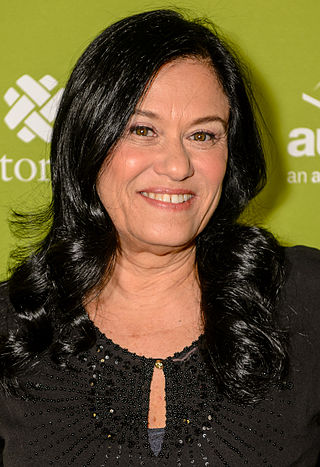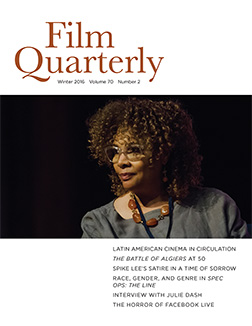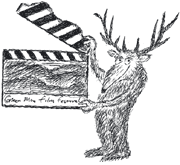David Holzman's Diary is a 1967 American mockumentary, or work of metacinema, directed by James McBride and starring L. M. Kit Carson. A feature-length film made on a tiny budget over several days, it is a work of experimental fiction presented as an autobiographical documentary. "A self-portrait by a fictional character in a real place—New York's Upper West Side," the film comments on the title character's personality and life as well as on documentary filmmaking and the medium of cinema more generally. In 1991, David Holzman's Diary was included in the annual selection of 25 motion pictures added to the National Film Registry of the Library of Congress, being deemed "culturally, historically, or aesthetically significant" and recommended for preservation.
Cinéma vérité is a style of documentary filmmaking developed by Edgar Morin and Jean Rouch, inspired by Dziga Vertov's theory about Kino-Pravda. It combines improvisation with use of the camera to unveil truth or highlight subjects hidden behind reality. It is sometimes called observational cinema, if understood as pure direct cinema: mainly without a narrator's voice-over. There are subtle, yet important, differences between terms expressing similar concepts. Direct cinema is largely concerned with the recording of events in which the subject and audience become unaware of the camera's presence: operating within what Bill Nichols, an American historian and theoretician of documentary film, calls the "observational mode", a fly on the wall. Many therefore see a paradox in drawing attention away from the presence of the camera and simultaneously interfering in the reality it registers when attempting to discover a cinematic truth.

Pauline Kael was an American film critic who wrote for The New Yorker from 1968 to 1991. Known for her "witty, biting, highly opinionated and sharply focused" reviews, Kael's opinions often ran contrary to those of her contemporaries.

Grey Gardens is a 1975 American documentary film by Albert and David Maysles. The film depicts the everyday lives of two reclusive, upper-class women, a mother and daughter both named Edith Beale, who lived in poverty at Grey Gardens, a derelict mansion at 3 West End Road in the wealthy Georgica Pond neighborhood of East Hampton, New York. The film was screened at the 1976 Cannes Film Festival but was not entered into the main competition.
Direct cinema is a documentary genre that originated between 1958 and 1962 in North America—principally in the Canadian province of Quebec and in the United States—and was developed in France by Jean Rouch. It is a cinematic practice employing lightweight portable filming equipment, hand-held cameras and live, synchronous sound that became available because of new, ground-breaking technologies developed in the early 1960s. These innovations made it possible for independent filmmakers to do away with a truckload of optical sound-recording, large crews, studio sets, tripod-mounted equipment and special lights, expensive necessities that severely hog-tied these low-budget documentarians. Like the cinéma vérité genre, direct cinema was initially characterized by filmmakers' desire to capture reality directly, to represent it truthfully, and to question the relationship between reality and cinema.

Albert Maysles and his brother David Maysles were an American documentary filmmaking team known for their work in the Direct Cinema style. Their best-known films include Salesman (1969), Gimme Shelter (1970) and Grey Gardens (1975).

Barbara Kopple is an American film director known primarily for her documentary work. She is credited with pioneering a renaissance of cinema vérité, and bringing the historic french style to a modern American audience. She has won two Academy Awards, for Harlan County, USA (1977), about a Kentucky miners' strike,[1] and for American Dream (1991), the story of the 1985–86 Hormel strike in Austin, Minnesota,[2] making her the first woman to win two Oscars in the Best Documentary category.

Gimme Shelter is a 1970 American documentary film directed by Albert and David Maysles and Charlotte Zwerin chronicling the last weeks of The Rolling Stones' 1969 US tour which culminated in the disastrous Altamont Free Concert and the killing of Meredith Hunter. The film is named after "Gimme Shelter", the lead track from the group's 1969 album Let It Bleed. Gimme Shelter was screened out of competition as the opening film of the 1971 Cannes Film Festival.

Film Quarterly, a journal devoted to the study of film, television, and visual media, is published by University of California Press. It publishes scholarly analyses of international and Hollywood cinema as well as independent film, including documentary and animation. The journal also revisits film classics; examines television and digital and online media; reports from international film festivals; reviews recent academic publications; and on occasion addresses installations, video games and emergent technologies. It welcomes established scholars as well as emergent voices that bring new perspectives to bear on visual representation as rooted in issues of diversity, race, lived experience, gender, sexuality, and transnational histories. Film Quarterly brings timely critical and intersectional approaches to criticism and analyses of visual culture.

Husbands is a 1970 American comedy-drama film written and directed by John Cassavetes. It stars Ben Gazzara, Peter Falk, and Cassavetes as three middle class men in the throes of a midlife crisis following the death of a close friend.

The Green Mountain Film Festival is an annual film event and awards show in Vermont. The first festival took place in Montpelier, Vermont, in 1997. In March 1999, a second festival was held and it has been an annual March event ever since. In 2010, the festival was extended to include a series of satellite screenings in St. Johnsbury, Vermont. In 2018, the festival also hosted screenings in Essex Junction, at the Essex Cinema.

Susan Steinberg is an American television producer, writer, and director. She is sometimes credited as Sue Steinberg.

Revelation Perth International Film Festival began in 1997. Founded by Richard Sowada to showcase a large range of independent feature films, documentaries, short films, and experimental works, it runs every July in Perth, Western Australia and is regarded as one of the best independent film festivals in Australia.
Howard Junker is a writer and editor.
Charlotte Zwerin was an American documentary film director and editor known for her work concerning artists and musicians. However, she is most known for her editing contributions to the direct cinema and cinéma vérité documentaries Salesman (1969), Gimme Shelter (1970), and Running Fence (1978) in which she was given co-director credits along with the two cinéma vérité pioneers Albert and David Maysles.

The 24th Cannes Film Festival was held from 12 to 27 May 1971. The Palme d'Or went to The Go-Between by Joseph Losey.
Porter Bibb is an American financier, media producer, and writer. He is best known as the first publisher of Rolling Stone magazine.

Great World of Sound is a 2007 comedy film directed by Craig Zobel. Zobel won Breakthrough Director at the Gotham Awards and the film also won the Grand Jury Award at the Atlanta Film Festival.

The 4th Toronto International Film Festival (TIFF) took place in Toronto, Ontario, Canada between September 6 and September 15, 1979. Due to overcrowding in the prior year, the Gala presentations were moved from the 700-seat Towne Cinema to the 1,600-seat Elgin Theatre. The People's Choice Award was awarded to Best Boy by Ira Wohl, which later won Oscar for Best Documentary Feature.
Michael Blackwood was a German-born American independent documentary filmmaker who founded Blackwood Productions, now known as Michael Blackwood Productions, in 1966.













